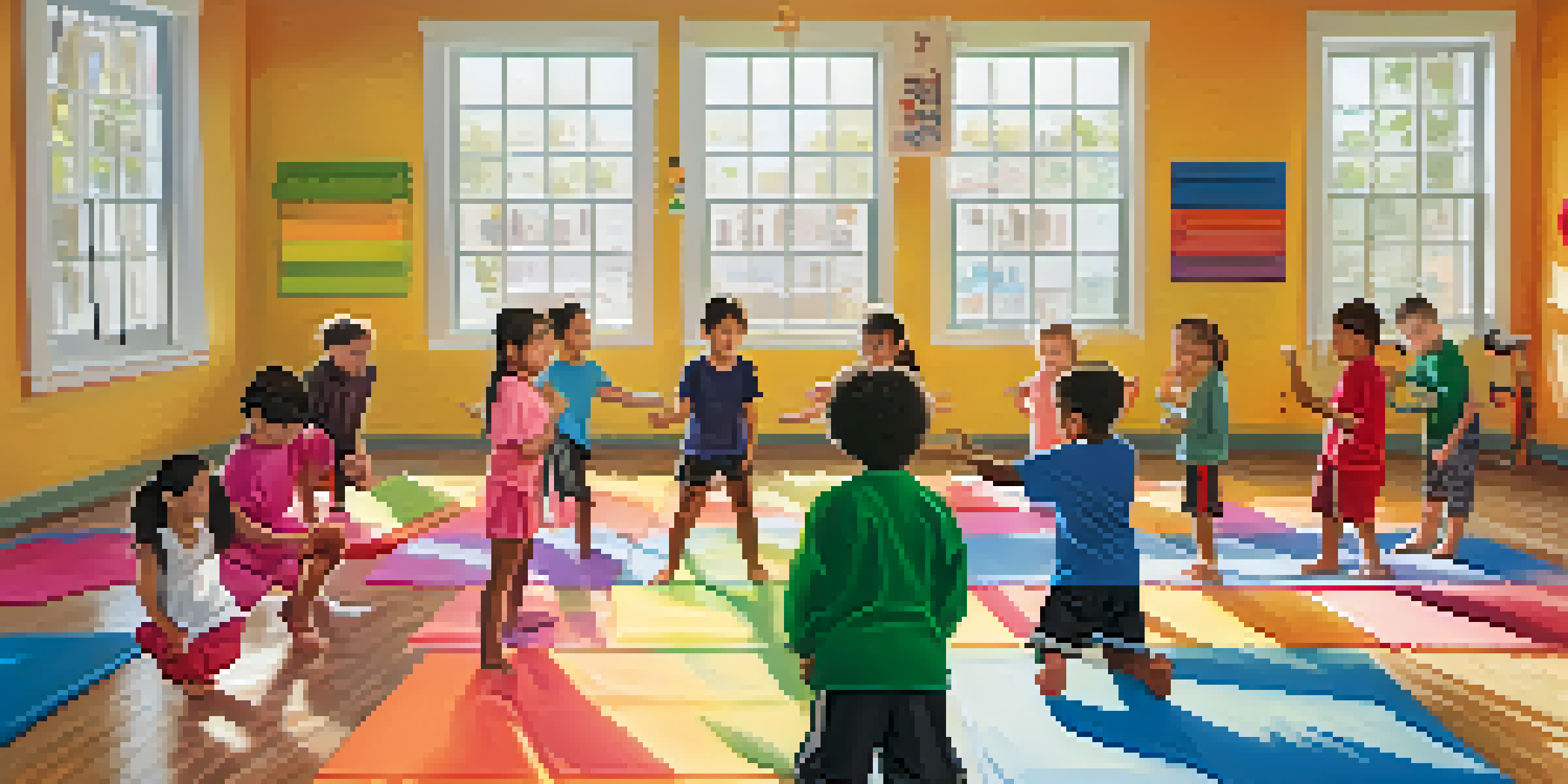Creating a Positive Mindset for Kids in Self Defense Classes

Understanding the Importance of Mindset in Self-Defense
A positive mindset is crucial in self-defense classes, as it helps kids feel more confident and capable. When children approach challenges with a can-do attitude, they are more likely to embrace learning and practice techniques diligently. This mindset not only enhances their physical skills but also prepares them mentally for real-life situations.
The greatest weapon against stress is our ability to choose one thought over another.
Moreover, a positive mindset fosters resilience, allowing kids to bounce back from setbacks, whether it's a tough training session or a difficult encounter. By cultivating this attitude, children learn that failure is just a stepping stone to success, encouraging them to keep trying until they master their skills. This resilience is vital in self-defense, where quick thinking and adaptability can make all the difference.
Finally, instilling a positive mindset in self-defense classes also promotes emotional well-being. Children who believe in their abilities are less likely to experience anxiety or fear, which can undermine their confidence. By creating a supportive environment that emphasizes positive thinking, instructors can help kids thrive both on and off the mat.
Creating a Supportive Environment in Classes
A supportive environment is the backbone of building a positive mindset in self-defense classes. Instructors should encourage open communication, allowing kids to express their feelings and concerns without fear of judgment. This approach not only builds trust but also helps children feel valued and understood, which is essential for their mental well-being.

Additionally, incorporating team-building activities can foster camaraderie among students. When kids feel connected with their peers, they are more likely to motivate each other and celebrate each other's successes. This sense of community encourages a positive atmosphere where everyone feels empowered to grow and learn together.
Mindset Boosts Self-Defense Skills
A positive mindset enhances children's confidence and resilience, preparing them for challenges in self-defense.
Finally, recognizing individual achievements, no matter how small, can significantly impact a child's mindset. Celebrating progress boosts self-esteem and reinforces the idea that effort leads to improvement. By consistently highlighting these successes, instructors can create an uplifting environment where kids are excited to participate and challenge themselves.
Incorporating Positive Affirmations
Positive affirmations can be a powerful tool in reinforcing a positive mindset for kids in self-defense classes. Encouraging children to repeat affirmations, such as 'I am strong' or 'I can defend myself,' helps instill a belief in their abilities. This simple practice can shift their focus from doubt to empowerment, making them more resilient in the face of challenges.
Success is not the key to happiness. Happiness is the key to success. If you love what you are doing, you will be successful.
Instructors can integrate affirmations into warm-up routines or during breaks, making them a natural part of the class. By creating a ritual around these affirmations, kids are more likely to internalize the messages and carry them beyond the training environment. This repetition fosters a sense of ownership over their abilities, enhancing their confidence.
Moreover, involving parents can amplify the impact of positive affirmations. Parents can reinforce these messages at home, creating a consistent narrative that builds self-esteem. By working together, instructors and parents can create a supportive framework that nurtures a child's positive mindset, both in and out of self-defense classes.
Setting Achievable Goals for Growth
Setting achievable goals is essential for promoting a positive mindset among kids in self-defense classes. When children have clear, attainable objectives, they are more likely to stay motivated and engaged. By breaking down larger goals into smaller milestones, kids can celebrate their progress along the way, reinforcing their belief in their abilities.
Instructors should work with each child to identify personal goals, whether it's mastering a specific technique or improving their confidence. This individualized approach not only makes learning more relevant but also empowers kids to take ownership of their growth. When children feel a sense of accomplishment, their positive mindset naturally flourishes.
Supportive Class Environments Matter
Creating a supportive environment in self-defense classes fosters open communication and encourages teamwork among kids.
Additionally, regular check-ins can help kids assess their progress and adjust their goals as needed. This adaptive approach teaches children that it's okay to shift their focus and refine their objectives based on their experiences. By fostering a growth mindset, instructors can help children embrace challenges as opportunities for learning and improvement.
Fostering a Growth Mindset Through Challenges
Encouraging a growth mindset is vital in self-defense classes, as it helps kids view challenges as opportunities rather than obstacles. When children encounter difficulties, instructors can guide them to reflect on their experiences and identify what they can learn from them. This shift in perspective not only builds resilience but also helps kids develop problem-solving skills.
To promote a growth mindset, instructors can introduce challenges that require creativity and adaptability. For example, setting up scenarios where kids must think on their feet can help them practice responding effectively to unexpected situations. As they navigate these challenges, children learn that perseverance and adaptability are key to success in self-defense and beyond.
Sharing stories of overcoming challenges can also inspire kids to embrace a growth mindset. When they hear about others who have faced difficulties and emerged stronger, they can relate these experiences to their own journeys. This sense of connection fosters a belief that they, too, can overcome obstacles and achieve their goals.
Encouraging Peer Support and Teamwork
Peer support is a powerful motivator in self-defense classes, as it fosters camaraderie and encourages positive interactions among kids. When students work together, they not only build relationships but also create an environment where everyone feels valued. This sense of belonging can significantly enhance their overall experience and mindset.
Instructors can facilitate teamwork through partner drills and group challenges, allowing kids to learn from one another. As they collaborate, students can share tips and techniques, reinforcing their skills and boosting each other's confidence. This collaborative learning approach helps children realize that they are not alone in their journeys, making them more confident in their abilities.
Parental Involvement is Key
Parents play a crucial role in reinforcing a positive mindset by supporting their child's journey in self-defense classes.
Additionally, encouraging kids to cheer each other on during practice can create an uplifting atmosphere. Simple words of encouragement can go a long way in fostering a positive mindset. By cultivating a culture of support, instructors can help kids develop a strong sense of community that empowers them in their self-defense training.
The Role of Parents in Building Mindset
Parents play a crucial role in nurturing a positive mindset for their kids in self-defense classes. By actively participating in their child's journey, whether through discussions about training or celebrating achievements, parents can reinforce the lessons learned in class. This support at home can solidify the positive mindset that instructors aim to instill.
Moreover, parents can model positive thinking and resilience in their own lives. When children see their parents navigating challenges with a growth mindset, they are more likely to adopt similar attitudes. This alignment between home and class creates a consistent narrative that reinforces the importance of perseverance and positivity.

Lastly, open communication between parents and instructors can enhance the overall experience for kids. Sharing insights about a child's progress or challenges can lead to tailored support that addresses individual needs. By working together, parents and instructors can create a holistic approach to fostering a positive mindset, ensuring that kids thrive in self-defense classes and beyond.